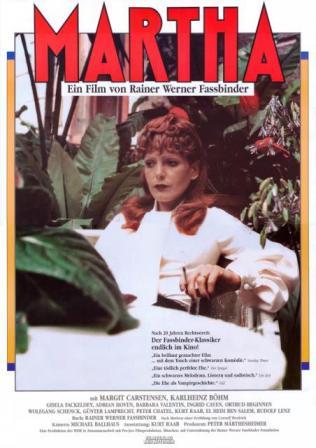
MARTHA
West Germany, 1973, 112 minutes, Colour.
Margit Carstensen, Karlheinz Bohm.
Directed by Rainer Werner Fassbinder.
Martha is one of the most accessible of Rainer Werner Fassbinder's films. Made especially for television in the early '70s, it relies on popular conventions of soap opera and melodrama - American style. Fassbinder always acknowledged his love for popular American `women's pictures' of the '50s, especially by director Douglas Sirk. In fact, Martha is adapted from a novel by Cornell Woolrich, the noted American author, whose stories were the basis for so many films including Rear Window.
The film stars regular Fassbinder stars Margit Karstensen and Karlheinz Bohm. Karstensen is, perhaps, too sophisticated an actress for the simple role of Martha. However, she gives it great melodramatic flair. Bohm (whose English language films ranged from The Wonderful World of the Brothers Grimm to Michael Powell's Peeping Tom) gives an extraordinary performance of a completely self-absorbed husband who wants to completely dominate his wife (echoes of Charles Boyer in Gaslight).
The film was lost from circulation for some time but was restored in the '90s. It is brightly coloured and is an interesting example of Fassbinder's style.
1.The film in Fassbinder's career, designed for German audiences, world audiences, television audiences?
2.The novels of Cornell Woolrich, their popularity in the United States, basis for so many films, the transition from the US to Europe? The overtones of opera, soap opera, Douglas Sirk melodramas - bright colours, musical score?
3.The title and its focus, the name of Martha Heyer (and the popular American actress Martha Hyer)?
4.Fassbinder and his variety of styles, straightforward narrative, direct and accessible presentation of themes and characters? His cast?
5.Martha at 31, alone, nervous and withdrawn? Yet her surface glamorous style? In Rome, the black man following her - and her alleged eyeing of him? Her domination by her father? In the hotel, the phone call to her mother, going up the Spanish steps, his sudden collapse and death? Her reaction, her upset about her purse being stolen? The chance encounter with Helmut at the embassy - and the circling shot with its emphasis on their meeting? Her phone call to her mother, being upset? The whole range of themes introduced in this early sequence?
6.Martha and her grief, dress, going home, her mother at the station, the arrival of the coffin? The aftermath and her mother drinking, their arguments, the truth about her mother, her husband drawn as the devil? Her relationship with her friends, talking and getting support?
7.The proposal of the librarian, her turning him down, the reasons? Her withdrawing into herself? Using her mother as a reason? Her friendship with Marianne and discussion about her marriage, the subordination to the husband? Ilsa and her getting married? Dreams versus reality? The discussion about the role of women? The perspective of the '70s - and later decades?
8.The marriage and the banquet, Helmut and his late arrival, the impact on meeting Martha - on each? His style, her reaction, her going out of the room, his passionate declarations and embrace? Her mother and her hostility? Taking Helmut home? The mother's melodramatic suicide attempt - and Helmut's selfish reaction, his change of heart and trying to help her? The mother going into an institution?
9.The omission of the marriage ceremony - and the transition to driving for the honeymoon, Martha's joy and talk, his silence, his mocking her and humiliating her? The holiday in Italy, the suntan oil, his refusal to put it on, the extraordinary sunburn, his sexual embrace and her pain? The revelation of his sadism? The effect on Martha, being dominated by him? Helmut seen from the perspective of the audience contrasting with Martha's view?
10.Helmut making her stay at home, the new home without reference to her, not allowing her her furniture? Her going to the job and finding that he had cut her off? Her playing the record - and his gift and despising her listening to Lucia di Lammermoor? His making her read the book of statistics? Not eating her meal and persuading her that he is right? His sexual encounters - and her suffering? His asking her for love of him not to go out? The effect on her?
11.The transition with Kaiser at the library, the singing of the song - and its being taken up again? Her being rude to him, her phone call, his listening to her, going for the drive, her obsession that she was being followed, grabbing the wheel, the accident, his death?
12.The sketch of her friends, their way of life, subordinate to their husband? Her mother's life? Her being able to phone them - and the cutting off of the phone?
13.Her attempts to please Helmut, reading the book, listening to the record? The cat - and his killing the cat and a further sexual encounter? His bringing her a gift and her terror of it?
14.The accident, her being in hospital, the doctor revealing the truth, paralysed, Helmut visiting her, her being in the wheelchair, the lift door closing and her being trapped for the future?
15.A credible portrait of Martha, following the pattern of her mother's life and marriage? The domination of women by men? Fate?